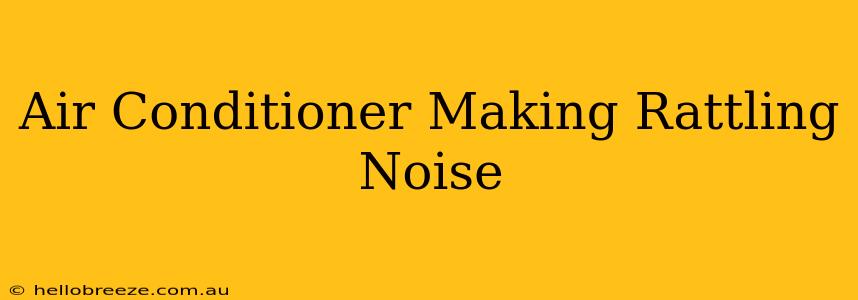Is your air conditioner making a rattling noise? This annoying sound can be unsettling, but often it's a sign of a relatively minor problem that you can potentially fix yourself. Ignoring it, however, could lead to more serious and costly issues down the line. This guide will help you diagnose the cause and find a solution to that rattling AC.
Common Causes of Rattling Noises in Air Conditioners
Several factors can contribute to your air conditioner's rattling. Identifying the source is the first step to silencing the noise.
1. Loose Parts: The Most Common Culprit
- Fans: The most frequent cause of rattling is a loose fan blade, motor mount, or other components within the fan assembly. Vibrations during operation can cause these parts to rattle against each other or the unit's housing.
- External Components: Check for loose panels, grills, or other external parts that might be vibrating against the unit. Even a small, loose screw can amplify the sound considerably.
- Condenser Coils: Sometimes, debris like leaves or other small objects can accumulate in the condenser coils, causing them to rattle against the unit's frame during operation.
2. Worn-Out Bearings
Over time, the bearings in your AC's fan motor can wear out. Worn-out bearings produce a characteristic rattling sound, which often intensifies as the motor speeds up. This requires professional attention.
3. Refrigerant Leaks
While not directly causing a rattling noise, a refrigerant leak can lead to unusual sounds as the compressor struggles. A low refrigerant level puts extra stress on the system, potentially leading to a range of strange noises, including rattles and clanks, alongside reduced cooling performance.
4. Ductwork Issues
If the rattling noise seems to be coming from within your ductwork, it's likely due to loose connections, poorly secured duct sections, or debris inside the ducts. This requires accessing and securing the ductwork, which might necessitate professional help depending on your access and comfort level.
Troubleshooting and Solutions
Before you call a professional, try these steps:
1. Inspect the Unit Thoroughly
- Safety First: Always disconnect the power to the unit before any inspection or repair.
- Visual Check: Carefully examine all visible components for looseness. Tighten any loose screws, bolts, or other fasteners you find.
- Check for Debris: Remove any leaves, twigs, or other debris that may be lodged in the unit.
2. Listen Carefully to Pinpoint the Source
Try to isolate where the sound is emanating from. This will help you narrow down the potential culprits.
3. Address Loose Parts
If you identify loose parts, tighten them securely. If parts are broken or beyond repair, you'll need to contact a professional for replacements.
4. Clean the Coils
Clean condenser coils regularly to prevent debris buildup. This will not only reduce the risk of rattling but also improve the efficiency of your AC.
When to Call an HVAC Professional
If you're uncomfortable working on your air conditioner, or if the rattling persists after trying these troubleshooting steps, it's best to call a qualified HVAC technician. Issues such as worn bearings or refrigerant leaks require specialized tools and expertise. Don't risk further damage by attempting DIY repairs beyond your capabilities. Ignoring a problem can lead to more extensive and expensive repairs later on.
Keywords: air conditioner rattling noise, AC rattling sound, troubleshooting AC noise, loose AC parts, worn AC bearings, AC repair, HVAC repair, air conditioner maintenance, AC troubleshooting, fixing AC noise, quiet air conditioner.

